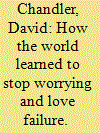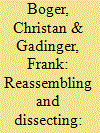|
|
|
Sort Order |
|
|
|
Items / Page
|
|
|
|
|
|
|
| Srl | Item |
| 1 |
ID:
145976


|
|
|
|
|
| Summary/Abstract |
Failure and denial are seductive concepts, and they were explicitly theorised at the Millennium conference in October, 2015. Though used to evoke an array of images to understand the condition of International Relations (IR) as a discipline and in relation to other social sciences, the concepts were not previously deemed pivotal for theorising world events. This article critically assesses how failure and denial are used by IR’s scholarly community as signifiers, and what it is that they signify. To this end, it considers Bruno Latour’s keynote address at the 2015 Millennium conference, along with some of Latour’s shorter works. Drawing on STS (science and technology studies), postcolonial and queer sensibilities, it concludes with a discussion of the significance of theatre in IR scholarship, and examines the broader social and political implications of how we think and understand failure and denial in the era of the Anthropocene.
|
|
|
|
|
|
|
|
|
|
|
|
|
|
|
|
| 2 |
ID:
109878


|
|
|
|
|
| Publication |
2012.
|
| Summary/Abstract |
This article seeks to provoke a deeper engagement of Critical Security Studies with security's relations to technology and weapons. It explores existing assumptions about these relations in mainstream arms control and disarmament theory, and the way such assumptions are deployed and distributed in the current settlement of arms control and disarmament practice. It then draws on recent social and philosophical discussions of materiality, particularly on the thought of Bruno Latour, to propose a different set of concepts for exploring the aims and limits of arms control and disarmament. These concepts emphasise the mediating roles of material things in social relations and they may offer a richer view of the object of arms control (weapons and violence) and of the practices of arms limitation and reduction; one that may ultimately gesture towards a different understanding of arms politics, and that may be used to explore the transformatory potentials of arms control and disarmament.
|
|
|
|
|
|
|
|
|
|
|
|
|
|
|
|
| 3 |
ID:
145979


|
|
|
|
|
| Summary/Abstract |
In modernity, failure was the discourse of critique, today, it is increasingly the discourse of power: failure has changed its allegiances. Over the last two decades, failure has been enfolded into discourses of power, facilitating the development of new policy approaches. Foremost among governing approaches that seek to include and to govern through failure is that of resilience. This article seeks to reflect upon how the understanding of failure has become transformed in this process, particularly linking this transformation to the radical appreciation of contingency and of the limits to instrumental cause-and-effect approaches to rule. Whereas modernity was shaped by a contestation over failure as an epistemological boundary, under conditions of contingency and complexity there appears to be a new consensus on failure as an ontological necessity. This problematic ‘ontological turn’ is illustrated using examples of changing approaches to risks, especially anthropogenic understandings of environmental threats, formerly seen as ‘natural’.
|
|
|
|
|
|
|
|
|
|
|
|
|
|
|
|
| 4 |
ID:
076499


|
|
|
|
|
| Publication |
2007.
|
| Summary/Abstract |
What does it take to be an international relations (IR) scholar? IR discourses have tackled this question with focus on very different problems: the role and function of IR scholars for policy; the (ir)relevance and impact of IR knowledge and expertise in world politics; disciplinary history; or in studying IR's institutions. We argue that all these "disciplinary sociology" debates struggle with the relation between an internal scientific IR world and an external social context (policy, society). We reject this distinction and argue that science studies can help us to address these problems more adequately by treating IR as a scientific practice that is closely tied to its social environment. The article sets out to explore science studies' possible contributions. Based on science studies key assumptions, we develop a heuristic by which the relations between IR and its environment can be grasped systematically. From this perspective, IR is pivotally a culture constituted by different domains of practice. Hence, understanding IR scholars in "doing IR" requires taking into account their daily and sometimes trivial practices. For instance, writing an article in IR means much more than only thinking theoretically at a desk. We systematize the different domains of practices as the articulation of knowledge claims, mobilizing the world, autonomy seeking, alliance building, and public representation. "Being an IR scholar" and "producing IR knowledge" depends inevitably on these sets of practices and IR is intrinsically interwoven with its environment through these.
|
|
|
|
|
|
|
|
|
|
|
|
|
|
|
|
| 5 |
ID:
123585


|
|
|
|
|
| Publication |
2013.
|
| Summary/Abstract |
In the 'human' world we believed that we could transform necessity into freedom through our own creativity and agency, understanding the laws of the external world and mastering them through the development of culture, science and technology. In the 'post-human' world, we are told by new materialists, actor-network theorists and post-humanists that creativity and agency still exist, but that they are not the property of humans alone; rather, they are a product of the assemblages, associations and relationships through which we are attached to the world. Rather than attempting to understand and act in the world on the basis of our separation from it - articulated in the constraining, alienating and resentment-filled modernist divides of human/nature, subject/object, culture/environment - we should develop our understandings of 'attachment' to the world. This article critically examines these claims and suggests that, on the contrary, we become less 'attached' and that the external word becomes increasingly alien and mysterious to us. In doing so, it mounts a defence of subject/object understandings and social constructions of freedom and necessity.
|
|
|
|
|
|
|
|
|
|
|
|
|
|
|
|
|
|
|
|
|